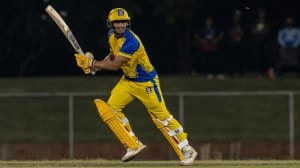‘Can Opposition’s politics address aspirations expressed by Modi with national pride?’: Michael Sandel at Express Adda
Politics of hope has to address cultural, spiritual sources that move people: Michael Sandel
 Michael Sandel in conversation with with Anant Goenka, Executive Director, The Indian Express, and Deputy Associate Editor Aakash Joshi. (Express Photo: Tashi Tobgyal)
Michael Sandel in conversation with with Anant Goenka, Executive Director, The Indian Express, and Deputy Associate Editor Aakash Joshi. (Express Photo: Tashi Tobgyal)A politics of hope can’t just be about “technocratic” things and the economy, but has to address the “deepest cultural and spiritual sources that move people,” that fuel their anger and resentments but also their aspirations, said Michael Sandel, one of the world’s foremost political philosophers, speaking at Express Adda Friday.
“For the most part, mainstream, liberal, elite technocratic politics,” Sandel said, “over the last four or five decades has had a tin ear to that dimension of politics and aspiration.”
Sandel is Anne T. and Robert M. Bass Professor of Government Theory at Harvard Law School. His “Justice” lecture series has received tens of millions of views online, earning him the label of “rockstar political philosopher.” His seminal works on distress in democracy, the moral limits of markets, and the many myths of meritocracy have shaped both public discourse and several areas of academic research in politics and society across the world.
https://youtube.com/watch?v=MKUCVIeZ_5Q%3Fsi%3DQjF9HQDd5H5HtQnP%26autoplay%3D1%26mute%3D1
At Adda, Sandel was in conversation with Anant Goenka, Executive Director, The Indian Express and Deputy Associate Editor Aakash Joshi. It spanned a broad sweep: the role of opposition in a democracy, what disagreement looks like in a world with a breakdown of civil liberties, and how to bring back a spiritual wholeness to liberal politics.
On the appeal of strongman political figures, Sandel underlined the need to look within. “The success of right-wing authoritarian populist figures and parties is usually a symptom of the failure of progressive politics. I certainly think that’s true in the United States with the success of (Donald) Trump. It should be an occasion not to look down on those people who are voting for Trump and similar candidates, but an occasion to ask if he is as disagreeable as we think he is, what does that say about us? Why have we failed to offer a compelling alternative? Does it have something to do with the tendency of elites to look down?”
Explaining this in the context of India, he asked: “Can there be an opposition party that reimagines an alternative vision of democracy that draws on India’s democratic tradition? Which is itself a source of great national pride. But (also one) that re-articulates the meaning of that democratic tradition in a way that speaks to the aspirations that (Prime Minister Narendra) Modi has articulated and expressed with national identity and pride?”
View this post on Instagram
On the tendency of democracies to tilt in favour of majorities, Sandel drew a distinction. “Democracy is not only about voting or majorities. Democracy, at its best, describes a public culture of deliberation, an ongoing argument and contestation. And so for democracy to flourish, it’s necessary (there) be sites and occasions for genuine citizen deliberation about these kinds of questions,” he said.
Why should a political party that can win elections based on its popularity with the dominant community, care for the minority? It’s simple, said Sandel. “Because one day, they too will be in the minority. And even more importantly – if they can’t bring themselves to imagine that possibility – respecting the minority is a fundamental condition of the mutual respect on which a decent society depends.”
“The ability to listen,” Sandel added, is a “necessary condition “ for both liberals and conservatives.
Crucial to this, according to him, is the ability to disagree, something exploited by tech companies and social media that use targeted advertising to “corrupt the possibility of healthy public discourse… by keeping us glued to our screens… enraging us. That’s a perverse business model that leads to corrupting tendencies.”
Sandel added that classrooms and universities are among the ideal spaces for such conversations, even when opinions run “afoul of the so-called allegedly woke opinion… and what’s seen as acceptable.”
Sandel recounted the origin of the term “meritocracy”, and how its originator, sociologist Michael Young, observing socioeconomic inequality reducing in 1950s Britain, denounced it later in his career, sensing the possibility of “those landing at the top” of the hierarchy “believing their success was their own doing and those who struggle have failed on their own.”
“He (worried that) those left behind will themselves absorb this sense of self-hate of ‘I’m just not good enough, I belong where I landed.’ He predicted that eventually, there would be a populist revolt that would overthrow the meritocracy in the year 2034. He was right, except that that revolt came 18 years ahead of schedule,” said Sandel, alluding to the 2016 election of Donald Trump as US President.
In a Q&A session with the audience later, Sandel said how “overhearing” his two sons talking and laughing in the next room gave him a great sense of “happiness.”
He said it was hard to be an optimist given the “hollowed out” public discourse and the challenges democracies face worldwide. But he had hope that the young, the manner in which they exchange ideas, ask questions, are an energising force for the future.
Among those who attended the Adda were Delhi High Court’s Justice Anish Dayal; Sanjay Kumar, Secretary, Department of School Education and Literacy; former Competition Commission chairperson Ashok Chawla; writer and journalist Nalini Singh; Vishal Sehgal, president, Harvard Club of India; senior advocate Prashanto Sen; former Delhi Police Commissioner Rakesh Asthana; writer Roswitha Joshi; and lawyers Mihira Sood and Sunanda Nair-Bidkar.







